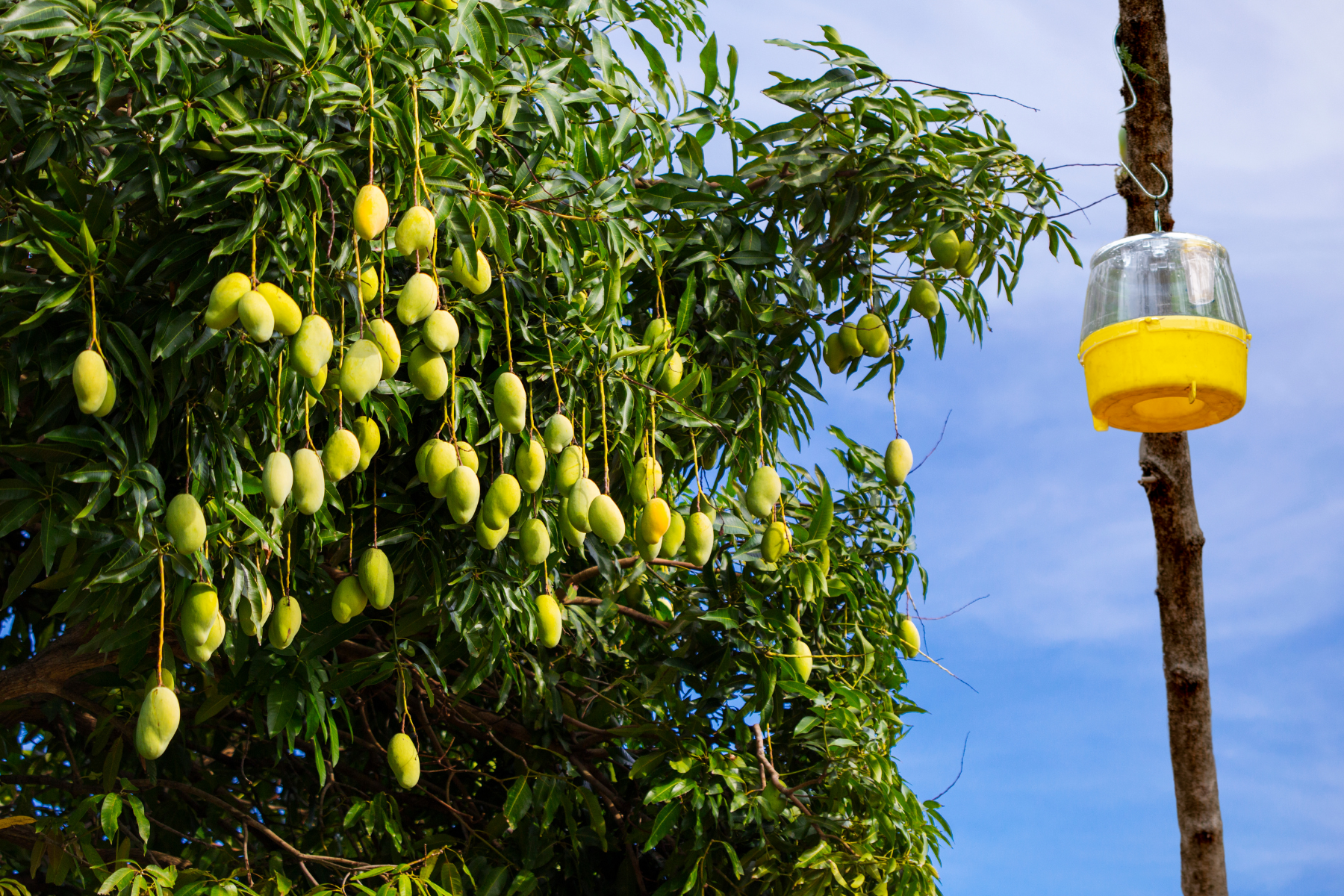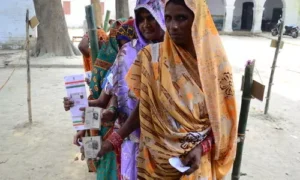Ganderbal, Jammu & Kashmir
Horticulture is the mainstay of Kashmir’s economy with 700,000 families directly or indirectly associated with the sector. It contributes over eight per cent to the Gross Domestic Product (GDP) of Jammu and Kashmir (J&K).
J&K has been declared as an Agri Export Zone for apple and walnut horticulture produce, and farmers have been using modern technology and taking benefits of various schemes to get better results.
As per the government figures, 750,000 families of about 3.5 million people in the Valley are directly or indirectly involved in the horticulture sector. More than 338,000 hectares of land is under fruit cultivation in the Valley. Of which 162,000 lakh hectares is under apple cultivation.
In 2020-21, there was a production of 2.035 million metric tonnes of fruits, that generated revenue of Rs 7,000-8000 crore.
As per the figures accessed from J&K horticulture’s department, apple is grown on 7,692 hectares of land in Central Kashmir Ganderbal district with 84,009 metric tonnes of fruit production during 2021-2022.
Similarly, walnut is cultivated on 5,445 hectares of land and a produce of 19,883 metric tonnes was recorded during the last fiscal. While 1,149 hectares of land is under cherry and 8,133 metric tonnes of the fruit was produced during 2021-2022.
KCC brings prosperity to farmers
As far back as August 1998, in a bid to provide term loan for agricultural needs of the farmers, Indian banks introduced the Kisan Credit Card (KCC) scheme.
The National Bank for Agriculture and Rural Development (NABARD) prepared the model of KCC through which it provided long term and medium term refinance to banks to support farmers and rural artisans in their investment activities.
Read: Gond and Baiga Tribe Women Help Revive Kodo-Kutki Millets in Madhya Pradesh
Ganderbal district is famous for cultivating apples, cherries and walnuts. In Ganderbal, which lies about 50 kms north east of Srinagar, for more than 15 years, NABARD has provided finance to farmers for their cultivation and other needs through the Cooperative Bank under KCC scheme. The NABARD is also the regulator of the scheme and conducts audits and inspections to ensure its proper implementation.
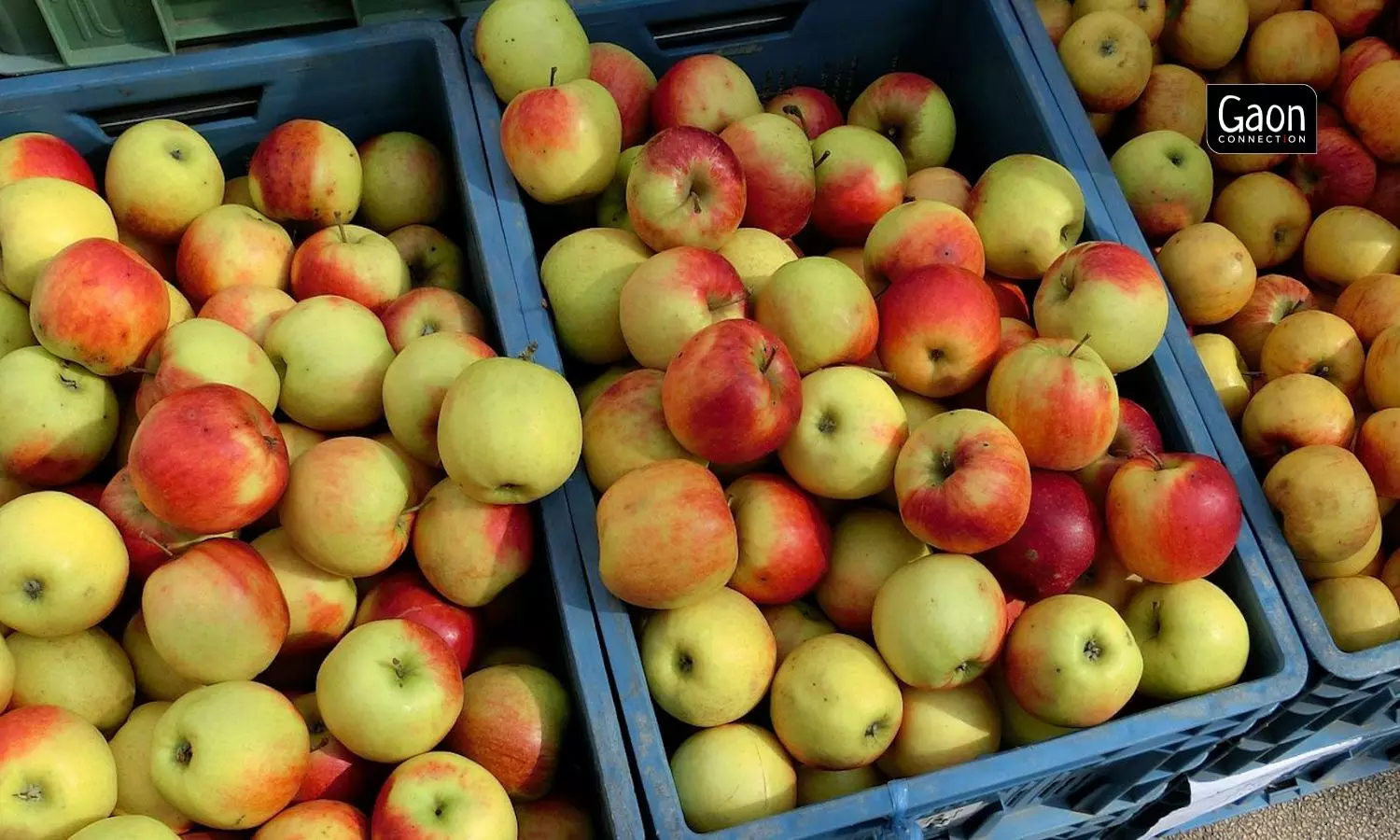
J&K has been declared as an Agri Export Zone for apple and walnut horticulture produce, and farmers have been using modern technology.
Seventy-year-old Ghulam Rasool Mir, who retired from government service in 2011, decided to cultivate fruits and vegetables on his ancestral land at Batwani in Ganderbal district. Taking advantage of the several government schemes, including KCC, he has increased his income, he said.
Taking advantage of the several government schemes, including KCC, he has increased his income, he said.
“Since retiring, I have grown fruits, vegetables and rear poultry. With the help of several government schemes including the KCC, I bought a tractor, built a tube well, a pond for vermicompost, a green house and filip to my orchard,” Ghulam said.
When he started, ten years ago, he would earn about Rs 4 lakh annually. Now, he earns Rs 10 lakh annually, from the apples he cultivates.
According to the Cooperative Bank, since the inception of the scheme, 2,413 cases have been sanctioned in Ganderbal district with an amount of over Rs 238.8 million. Ghulam is one of 2,373 beneficiaries in the district who have already been given loans worth Rs 232.4 million.
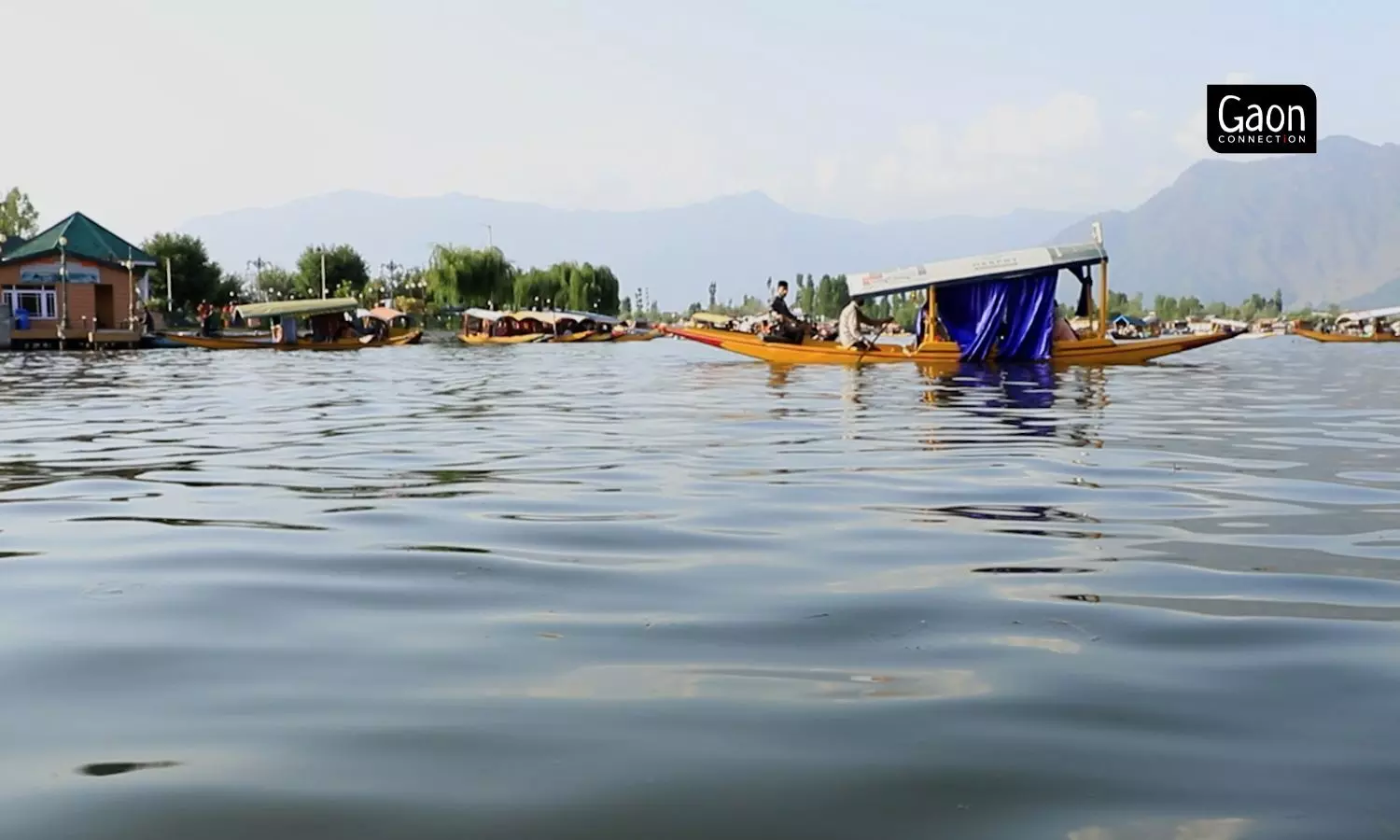
Horticulture is the mainstay of Kashmir’s economy with 700,000 families directly or indirectly associated with the sector.
Akhtar H Malik, a junior scientist at Department of Botany, University of Kashmir said Ganderbal district produces some of the best quality fruits like grapes, cherry and walnut.
“It is because of soil factor. It has fertile soil which is good for crops. In Ganderbal district, there is also less water logging because of its hilly terrain. Besides, the Sindh river also flows through which helps in irrigating our fields,” he said, and added that the people in these areas had aeons of experience cultivating fruit trees.
Doubling of income
Farmer Mohammad Ramzan Bhat, owns 0.75 hectare of apple orchard at Batwani village in Ganderbal.
The 60-year-old said that government support had helped him double his income in the past 10 years.
“Ten years ago, I earned four lakh rupees annually. Now I earn eight lakh rupees annually and am far more economically stable,” Bhatt said. “With help from KCC, I have been able to develop my orchard. We are pruning and using pesticides on time. We grade the fruits and pack them accordingly and thanks to KCC, I was able to develop all this,” he added.
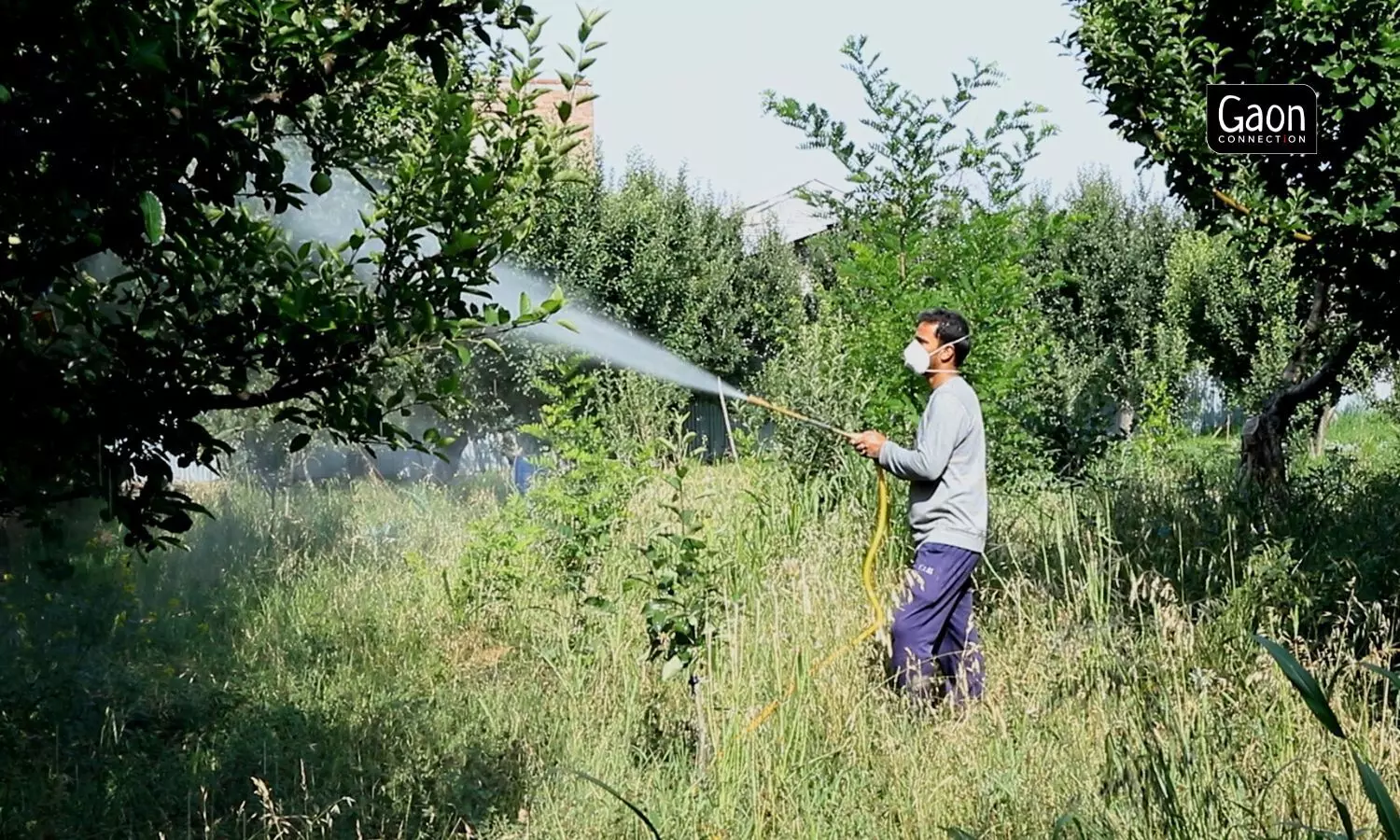
According to the Cooperative Bank, since the inception of the scheme, 2,413 cases have been sanctioned in Ganderbal district with an amount of over Rs 238.8 million.
Ghulam Mohammad Rather, a 65-year-old fruit grower from Ahan village in Ganderbal, has been growing apples, cherries and walnuts on 2.5 hectares of ancestral land for more than 50-years. But, he said it was in the last 15 years that he has been able to make great progress on his orchards.
“There has been a huge change in our horticulture sector. I managed to build a borewell to irrigate my orchards, bought a tractor after taking Rs 5 lakh under the KCC scheme in 2011. There is a lot of subsidy available for farmers under different schemes,” Rather said.
Fruit Growers’ Society brings more benefits
The Batwina Fruit Growers Co-operative Society Ltd, the lone horticulture society in the entire J&K, was established by local growers of Ganderbal district in 1985. There are 239 farmers registered with the society including Ghulam and Mohammad.
An official, Mohammad Ramzan said that the society facilitates farmers to sell fruit at a good price in the market.
“If a farmer directly takes his produce to a mandi, he has to pay a twelve per cent commission to the selling agents. But, for those who sell through the Society, the commission is less than six per cent, which gives a good profit to the farmer on his produce,” the official said.
Also Read: Strawberry Brings Sweet Tidings to Bundelkhand Farmers
The society provides pesticides and fertilisers to farmers, besides informing them about the various government schemes they could avail of.
In September 2019, the Market Intervention Scheme was launched when farmers could not sell their produce due to the restrictions in Kashmir Valley following the abrogation of Article 370.
Under the scheme, the National Agricultural Cooperative Marketing Federation of India Ltd. (NAFED) would procure the apples directly from the growers/aggregators at optimum prices. The payment would be directly credited into the bank accounts of the growers through Direct Benefit Transfer (DBT) mode.
However, the scheme has been suspended since COVID.
Horticulture, the top priority
Aijaz Ahmad Bhat, Director General, Horticulture Department, J&K, said horticulture was a top priority of the government.
“Ganderbal is known across the world for producing top quality cherry and grapes. Many people in other districts are introducing these fruits in their orchards. And there are a number of schemes including KCC available which farmers benefit from,” Aijaz said.
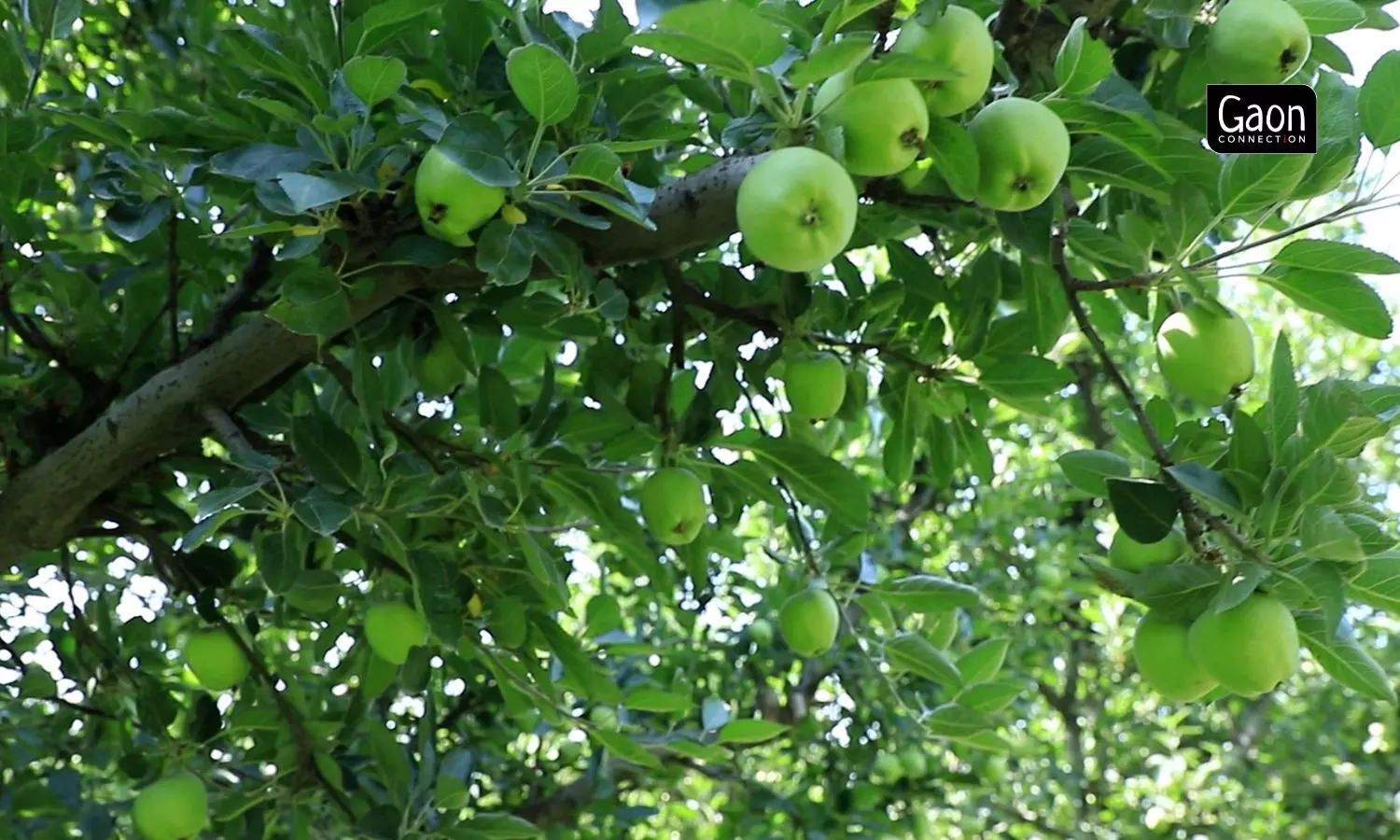
Substandard fertilisers and pesticides are a bane for the farmers involved in horticulture in Kashmir.
According to the director general, the government has also taken several measures to check the quality of fertilisers and pesticides. “We provide timely advice to farmers when to make a spray so they get better results,” he added. The topography and soil quality of Ganderbal is perfectly suited to grow cherries, he said. “Over 60 per cent of cherries grow in Ganderbal and it is known as the cherry capital of J&K,” he added.
A fruit and vegetable market was established in 2016 at Zazna, Ganderbal for the farmers at the cost of Rs 7 crore, said Sarwat Ahmad, a senior official of the Horticulture Department. “We are also creating awareness about marketing, packaging and grading of fruits to farmers. We tell them how to handle fruits post harvesting. There are 196 markets in India, where fruits from this region are sold,” he said.
Challenges: Lack of cold storage facilities
Ubrogation of Article 370, and the pandemic, have proved to be a challenge to the horticulture sector.
One of the greatest drawbacks has been a lack of a cold-storage facility in Ganderbal district. “If we had one, we could keep our fruits and save them from perishing and sell them at a good price. But now, once we pluck the fruits, we have to sell them within two days as otherwise they will spoil,” Ghulam Rasool Mir said.
Ghulam Ahmad Mir, of Bagwanpora village, Ganderbal along with his brother owns over three hectares of land on which they grow apples.
Also Read: How an FPO in Barpeta, Assam, has left fish farmers swimming in profits
“Six years ago, I took three lakh rupees under KCC. We planted new apple trees as old ones had withered over the years. We earn Rs 8 lakh annually now while a decade ago we earned Rs 5 lakh a year. But we could have earned more if we had cold storage in Ganderbal. We are not able to store our produce and then sell at better prices,” he said.
“There has been 40-50 per cent losses to farmers for the last three years. We could not sell our fruits on time, nor could we store due to lack of cold storage facilities in Ganderbal resulting in heavy losses,” Ghulam said.
While Ghulam Rasool Mir was happy about the doubling of his income through his orchards, he said more than half his earnings went towards labourers and the cost of pesticides and fertilisers.
Challenges: Substandard fertilisers and pesticides
Substandard fertilisers and pesticides are another bane. “Had there been a check on fertilisers and pesticides, there could have been huge changes on the ground and largely benefitted growers,” Ghulam Rasool Mir said. He wished the government would provide fertilisers and pesticides at subsidised rates.
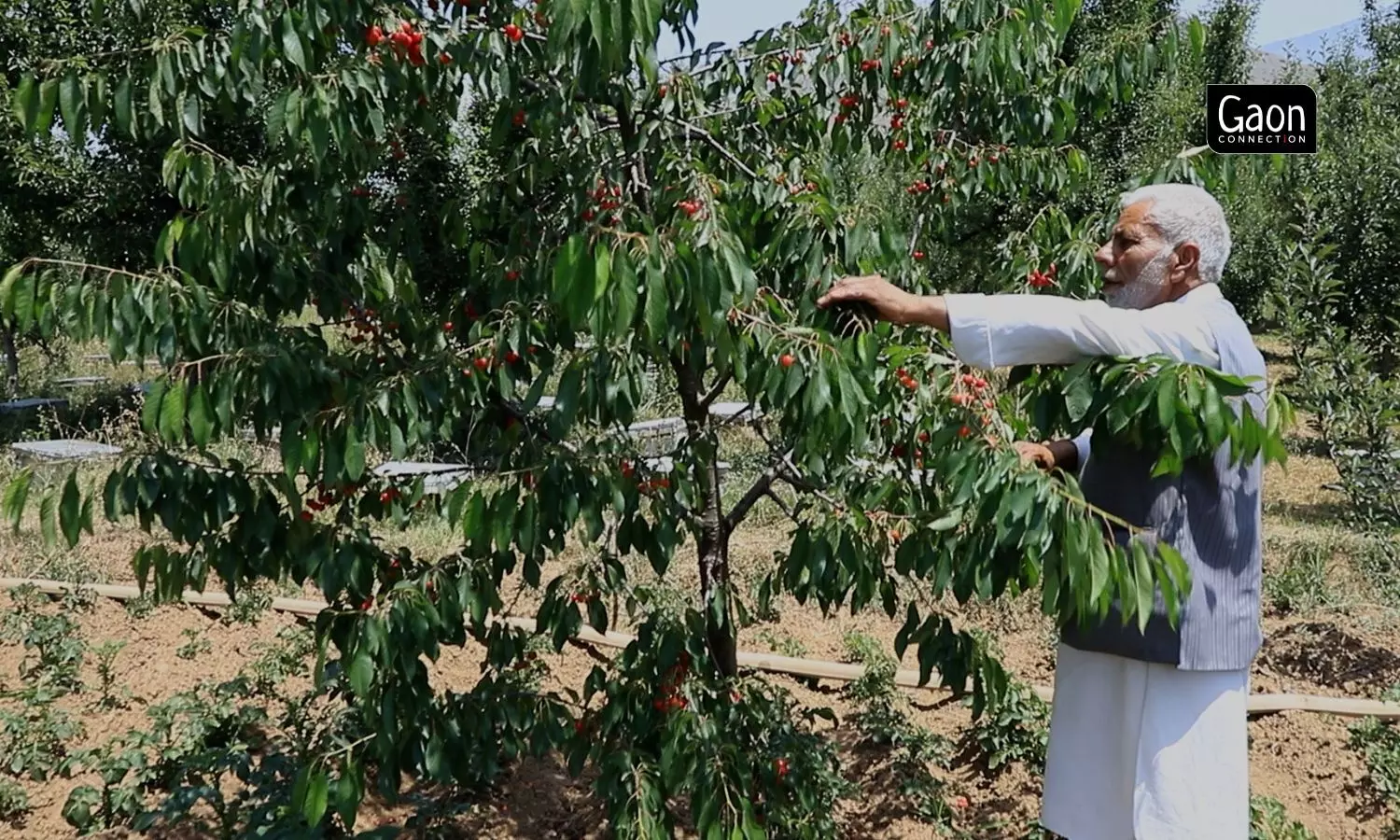
Ganderbal district is famous for cultivating apples, cherries and walnuts.
“Although schemes have been of great help, the government should also check the quality of pesticides and fertilisers and provide them to the farmers at subsidised rates,” he said. Having a cold storage and better quality pesticides and fertilisers at subsidised rates could see farmers making even better profits.
Ghulam Rasool Mir also said his yearly earnings have increased to Rs 10 lakh from Rs 5 lakh a decade ago. “But the expenses have also increased,” he pointed out.
Challenges: Climate change and irrigation troubles
Kashmir’s horticulture sector needed better irrigation facilities as it relied mostly on natural precipitation, experts say.
This year, the lack of precipitation and the hailstorm has been a cause of concern for farmers like Ghulam.
“In the second week of March, my fruit trees were flowering so well that I expected a bumper crop,” Ghulam said. But, in two weeks most of the flowers had faded and many of his apple trees had withered.
First the rising temperatures, and then the hailstorm that lashed the valley on April 25, worsened matters.
According to figures from the Meteorological Department, there has been 70-80 per cent deficiency of precipitation between March 1 and April 21 this year in Kashmir. Kashmir received only 43 mm against an average normal precipitation of 209 mm. Changing pattern of rainfall is affecting farmers and their produce.
This story has been done as part of a partnership with NABARD.







